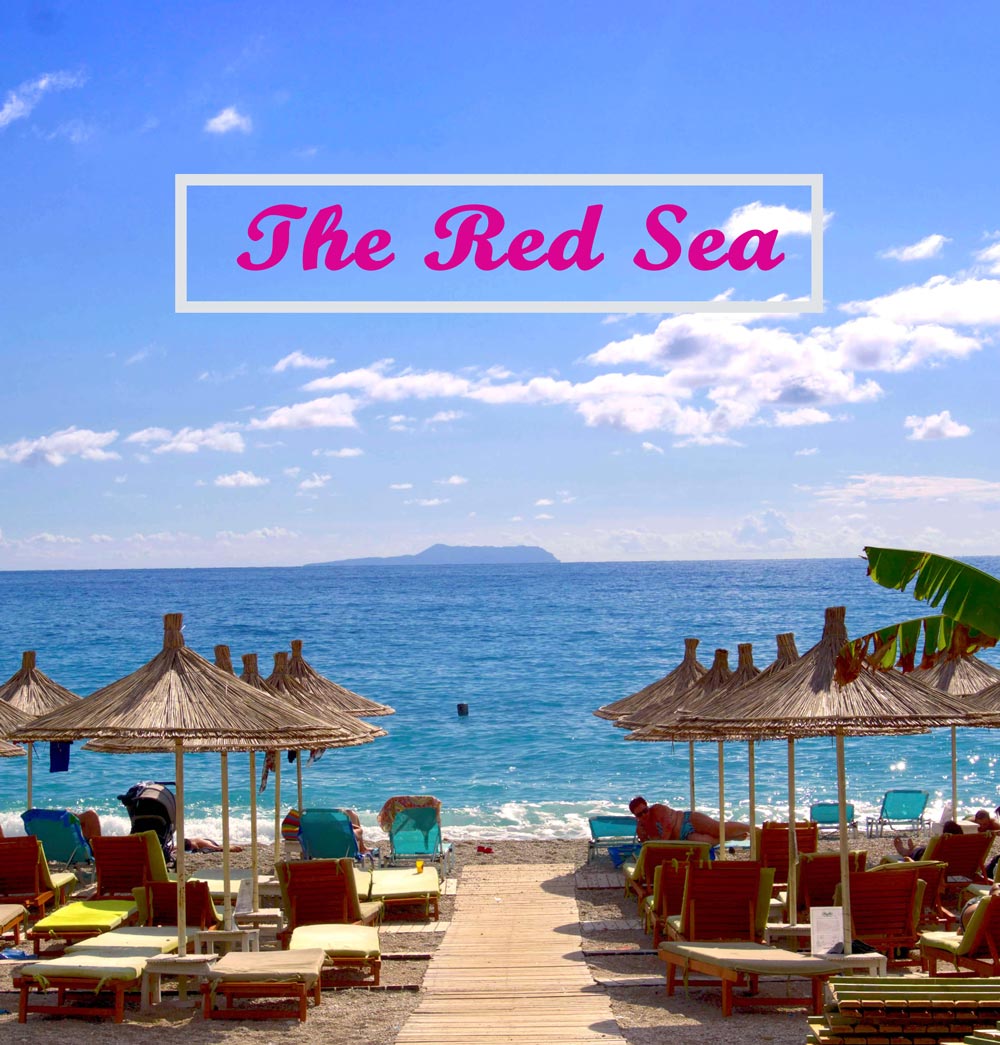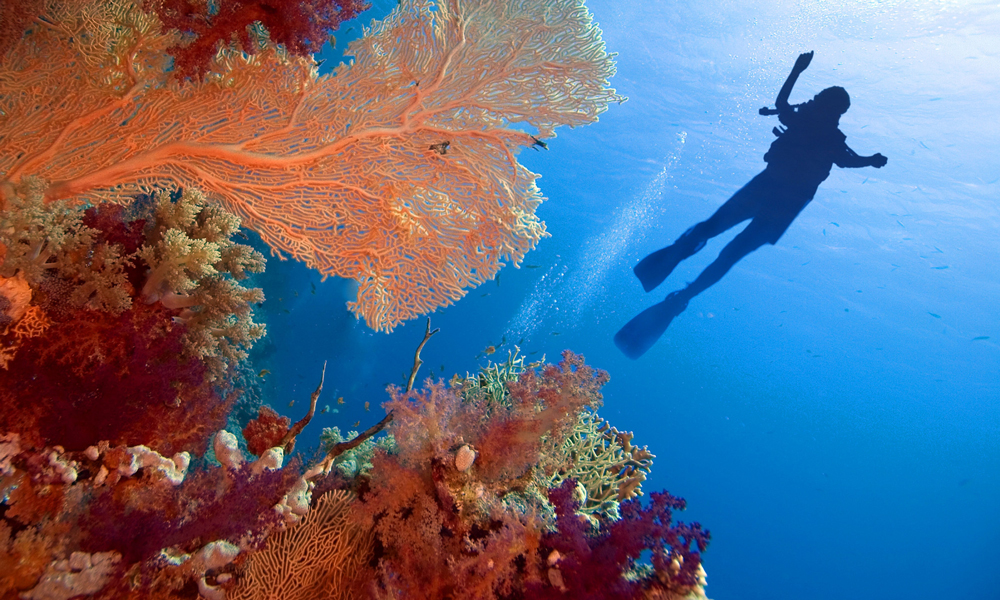
The Red Sea is the world's northernmost tropical sea and occupies a part of the Great Rift Valley. The Maximum width of the Red Sea is 355 km, the maximum length is 2,250 Km, and the water volume in the Red Sea is 233,000 km3. The Red Sea has a surface area of about 174,000 square miles (438,000 km²) which is 1,398 miles (2250 km) long and, at its widest point is over 220 miles (355 km) wide. It has a maximum depth of 9,970 feet (3,040 m) in the central median trench and an average depth of 1,608 feet (490 m), but many shallow shelves are located deep known for containing enchanting marine life such as over 1,000 invertebrate species and 200 soft and hard corals.
The first exploration of the Red Sea started around 2500 BC.and again in 1500 BC when the ancient Egyptian attempted to explore the red sea. The ancient Egyptians built many canals across the red sea but none of them lasted. The Red Sea was mentioned heavily in the Biblical book of Exodus which describes the holy Crossing of the split of the waters of the red sea. In the 6th century BC, Darius I of Persia made the Red Sea his navigation project. After two centuries, Alexander the Great continued the exploration process where he sent his naval expeditions to harness the resources of the Red Sea and cross the Indian ocean. From that time forward, the Red Sea has played a crucial role in trading and linking countries together across the centuries until our current day.
In the second century B.C.E, The renowned scholar Agatharchides has collected facts and information about the red sea. In the first century C.E, The Periplus of the Erythraean Sea, written a detailed description of the Red Sea's ports and sea routes and describes how Hippalus first discovered the direct route from the Red Sea all the way to India.
The Roman Empire took interest in the red sea as an excellent route for trade with India. AS through the red sea From Indian ports, goods from China were introduced to the Roman world. The main contact between Rome and China depended heavily on the Red Sea, but the route was damaged by the Aksumite Empire around the third century C.E. During medieval times the Red Sea was an important part of the Spice trade route. In 1798, Napoleon Bonaparte invaded Egypt and captured the Red Sea but failed to take lasting control. With the rise of Oil traffic across the red sea, both the Americans and the Soviets took a real interest in the red sea. It remains the most important sea in the world that acts as a shortcut connecting the east to the west.
The weather around the Red sea tends to be warm in summer and cold in winter. The average water temperature is 22 °C. The temperature in winter can be 28 °C and 34 °C in summer. Its climate is a result of two monsoon seasons, which are a northeasterly monsoon and a southwesterly monsoon. The surface water temperatures of the red sea remain relatively constant at 21–25 °C (70–77 °F) and visibility remains good at around 660 feet (200 m). The Red sea is known for its strong winds and local currents.
The Red Sea is a direct translation of the Greek "Erythra Thalassa" Latin Mare Rubrum, Arabic Al-Baḥr Al-Aḥmar, and Tigrinya Qeyḥ bāḥrī. The name of the Red Sea has many origin stories as the name red could signify the seasonal blooms of the red-colored cyanobacteria "Trichodesmium erythraeum" which is located near the water's surface. Many believe it could refer to the mineral-rich red mountains which are called Harei Edom, which means "ruddy complexion," that is an alternative Hebrew name for the red-faced biblical character Esau (brother of Jacob), and the nation descended from him, the Edomites, which in turn provides yet another possible origin for the Red Sea.
The Red Sea was is borders the Egyptian Desert which the ancient Egyptians called the Dashret or "red land"; it would have been the sea of the red land. Some believe that the name comes from the Himyarite, a local group whose own name means red.
Another theory states that the name red refers to the direction south, just like the Black Sea's name refers to the north. The theory goes that some Asiatic languages used color words to refer to the cardinal directions such as the Greek historian Herodotus who uses "The Red Sea" and "Southern Sea" interchangeably at different times during his writings.
The Red Sea is an inlet, a means of entry to the Indian Ocean between Africa and Asia. The red sea connection is to the ocean in the south through the Bab el Mandeb strait and the Gulf of Aden. In the north are the Sinai Peninsula, the Gulf of Aqaba, and the Gulf of Suez which leads to the Suez Canal.. There are nine countries that share the shoreline of the Red Sea which are Djibouti, Egypt, Eritrea, Saudi Arabia, Sudan, Yemen Somalia, Israel, and Jordan. Each one is connected to the shores in a different direction such as:
Northern Shore:
Egypt
Isreal
Jordan
Eastern Shore:
Saudi Arabia
Yemen
Western Shore:
Sudan
Egypt
Eritrea
Southern Shore:
Djibouti
Eritrea
It is about 2200 km long and its width is 330 km. The Suez Canal connects the Red Sea to the Mediterranean Sea and Bab El-Mandab which is why many ships go through the Red Sea. There are many Ports of the Red Sea like Jeddah, Suez, Safaga, Aqaba, Eilat, Port Sudan, and many more. The Sea is the home of more than 1000 different species of fish and 200 hard and soft corals. There are many countries next to the Red Sea such as Egypt, Saudi Arabia, Sudan, Yemen, and Israel.
Resources: There are five important types of resources in the Red Sea, which are Petroleum deposits, evaporate deposits, sulfur, phosphates, and heavy-metal deposits.
Navigation: It is difficult to navigate in the Red Sea. There are two channels that are kept open for shipping at Bab El-Mandab strait and Suez. The irregular water currents add to the navigational hazards.
The Red Sea is known to be a rich and diverse ecosystem filled with more than 1,100 species of fish and 10% of this marine life are located in the red sea. The red sea includes around 42 species of deepwater fish.
The main reason behind the rich diversity is partly due to the 2,000 km (1,240 mi) of coral reefs that extend along its coastline. these incredible reefs date back to about 5000-7000 years which were formed of stony Acropora and porites corals. The Red Sea holds 175 species of nudibranch which can only be found there. These coastal reefs have up to 44 species of shark. Other aquatic creatures live in the red sea such as seagrass beds, salt pans, mangroves, and salt marshes.
The special biodiversity of the red sea is recognized and monitored by the Egyptian government, which set up the Ras Mohammed National Park in 1983. The main goal of all the rules and regulations of this place is for protecting local wildlife, and marine life.

This fanciful sea played a crucial role in shaping the life and history of Ancient Egypt and changed the way people lived and thought through providing different facilities and possibilities such as Transportation: Sea transportation is much easier than land transportation that’s why civilizations that had direct access to water had the advantage as it facilitated in the trading of goods, technological achievements, and cultural ideas. The Red Sea helped Egypt to have access to Africa and the east part of the world. Stability: The stability of the geographical location is the thing that helped in the rise of Ancient Egyptian Civilization. It was the reason behind having a stable agricultural system. Without the Red Sea, Egypt would have been an isolated place and there won’t be any technological development and stability. Cultural Exchange: The Red Sea provided not only access to Africa and the east but also helped in exchanging things much further than goods. It helped the ancient Egyptians to exchange culture and knowledge with other civilizations and countries.
Nothing can compare to exploring the heritage and legacy of ancient Egypt where history was made in this timeless everlasting destination. Through our Egypt vacation packages, you will enjoy a paradise surrounded by everything you can imagine from a magical destination that exhibits mind-blowing historical facts, marvelous locations, and the most enjoyable activities at the most affordable prices.
Private 4 Days Cairo Tour Packages for Canadian Travelers 4 days Cairo Egypt Tour pa...
Tour Location: Cairo – Giza...
5 Days Cairo and Alexandria Tour Package For Canadian Travelers 5 days Cairo and Ale...
Tour Location: Cairo/Giza/Alexandria...
6 Days Cairo, Luxor & Aswan Tour Package For Canadian Travelers 6 days Cairo, Lu...
Tour Location: Cairo/Giza/Aswan/Luxor...
Amazing 7 Days Cairo and Hurghada Holiday for Canadian Travelers 7 Days Cairo & ...
Tour Location: Cairo – Giza – Hurgh...









